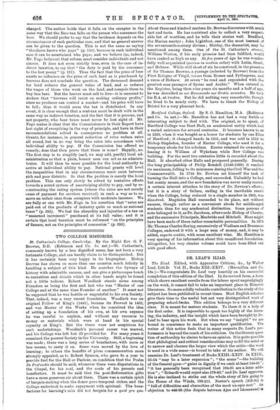TWO COLLEGE HISTORIES.
St. Catharine's College, Cambridge. By the Right Rev. G. P. Browne, D.D. (Robinson and Co. 5s. net.)—St. Catharine's, commonly known by a less dignified name, has not been a very fortunate College, and can hardly claim to be distinguished.. But it has certainly been very happy in its biographer. Bishop Browne has shown on more than one occasion much felicity in handling a subject of this kind. He searches the byways of history with admirable success, and can give a picturesque touch to narratives and details which in other hands might be found not a little tedious. Robert Woodlark stands alone among Founders as being the first and last who was "Master of one College and at the same time Founder of another." It must not be supposed that he was hostile or ungrateful to his own Society. That, indeed, was a very recent foundation. Woodlark was an original Fellow of King's (1441), became its Provost in 1452, and was Master of the Works when he conceived the idea of setting up a foundation of his own, at his own expense he was careful to explain, and without any recourse to money or materials which were at hand in his special capacity at King's. But the times were not auspicious for such undertakings. Woodlark's personal career was marred, and his College was left but ill provided for. For many years it remained the poorest Society in the University. Still, a beginning was made ; there was a long series of benefactors, with more or less means, to carry it on. Some were moved by the love of learning; to others the benefits of pious commemoration more strongly appealed, as to Robert Symson, who gave 8s. a year to provide fuel for the Hall or Parlour, on condition that the Psalm De Profundis should be said, whenever there were disputations in the Chapel, for his soul, and the souls of his parents and benefactors. It must be said that the post-Reformation gifts have a more generous air about them. There was a certain spirit of bargain-making when the donor gave temporal riches, and the College undertook to make repayment with spiritual: The bene- factions for learning's sake did not bargain for a quid pro quo. About these and kindred matters Dr. Brownediscourses with much tact and taste. He has contrived also to collect a very respect.. able list of - worthies, and •he tells their stories well. Bradford, the Marian martyr ; John Lightfoot, one of the most learned of the seventeenth-century divines ; Shirley, the dramatist, may bo mentioned among them. One of the St. Catharine's alumni, William Wotton, if his early pkenise had been fulfilled, would have ranked as high as any. At five years of age he was wonder. fully well acquainted (minim in modum callet) with Latin, Greek, and Hebrew. While still short of six he construed, in the presence of Sir Thomas Browne, a passage (selected by Browne) from the First Eclogue of Virgil, verses from Homer and Pythagoras, and a verse of Hebrew. At seven " he read and expouhded with the greatest ease passages of Syriac and Arabic." When entered in the Register, being then nine years six months and a half of age, he was described as nec Hammond° nec Grotio secundus. He took his B.A. at twelve. But he did nothing very remarkable; though he lived to be nearly sixty. We have to thank the Bishop of Bristol for a very pleasant book.


























































 Previous page
Previous page